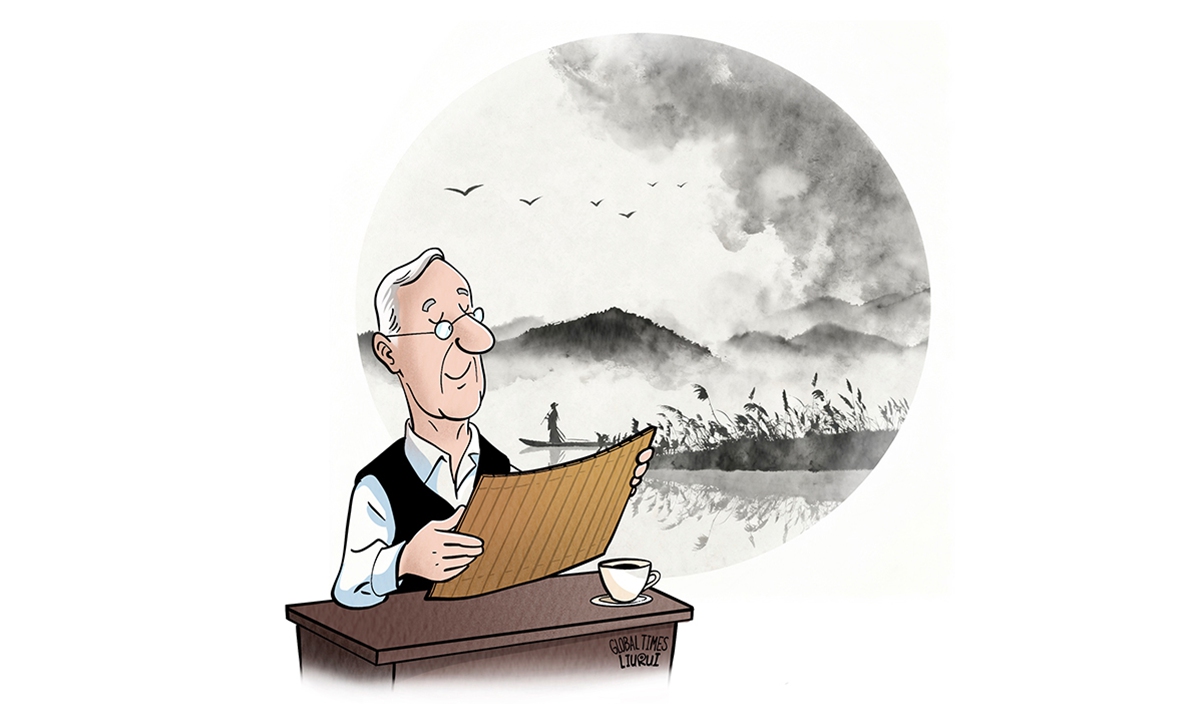Commentaries
Your Present Location: Teacher_Home> Ding Gang> Commentaries‘Book of Songs’ offers an opportunity to bridge East-West understanding
‘Book of Songs’ offers an opportunity to bridge East-West understanding
Source: Global Times
By Ding Gang
Update: Nov 13th, 2025, 9:48 PM

Illustration: Liu Rui/GT
In recent days, new archaeological discoveries have been made at the Marquis of Haihun site in Nanchang, capital of East China's Jiangxi Province. During excavation and cleaning, archaeologists unearthed a batch of extremely precious bamboo slips.
Preliminary comparisons by experts have confirmed that many of the slips correspond to passages from the Book of Songs. As of 2025, this represents the oldest complete physical manuscript of the Book of Songs ever discovered in China.
The Book of Songs was composed roughly between the 11th and 6th centuries BCE. It is the earliest and most systematically preserved anthology of Chinese poetry. This discovery has sparked enthusiastic responses across Chinese media and online platforms, reflecting the profound cultural and historical significance of the Book of Songs in China's collective consciousness.
However, after searching major Western media outlets, I found that almost none of them covered this event. This is hardly surprising. Although Western media today publish a daily stream of reports about China, their focus remains mainly on China's military strength, scientific innovation, and economic and political issues. As for the Book of Songs, it is likely that most editors and journalists reporting on China have never read it - or even a single poem from it.
As a journalist who has long been engaged in reporting China's place in the world, what concerns me most about this archaeological discovery is not merely its value as an artifact, but whether it might serve as an opportunity - beyond poetry itself - for the world to rediscover and reinterpret Chinese civilization.
In recent years, China's archaeological fieldwork has produced numerous vital discoveries, each of which, I believe, can enrich China's global cultural presence and deepen the world's understanding of its ancient spiritual traditions.
Since the 19th century, Western scholars have tended to focus on texts that more closely align with their own philosophical frameworks - such as the Tao Te Ching for its naturalistic philosophy, or The Art of War for its rational strategy.
Western intellectuals relish discussing power, law, fate and will, yet struggle to grasp a civilization that harmonizes politics through "ritual and music" and channels emotion through poetry. As a result, the Book of Songs has faced a "diminished fate" in the West - appreciated aesthetically, but rarely understood intellectually.
This situation stems not only from the challenges of translation but also from structural inequalities among civilizations. Whoever occupies the center of the world determines what is recognized as "universal."
During the 19th and 20th centuries, the Western world had little need to "understand China's culture" - the functioning of the modern world did not depend on Chinese knowledge. But the world today is no longer the same. With China's rise, this ancient civilization is no longer a distant "other," but an inescapable structural reality in global affairs. Increasingly, Western scholars recognize that their own political and philosophical languages are inadequate for explaining China's social logic.
Where, then, does China's sense of order originate? What sustains a non-religious, non-contractual civilization's long-term stability? How has such a civilization managed to build enduring political coherence without invoking "God" or a "social contract"?
To answer these questions, one must return to cultural foundations such as the Book of Songs.
The recently unearthed bamboo slips of the Book of Songs offer concrete evidence for such exploration and open up broader vistas for understanding the inner structure of Chinese civilization.
Yet "discovery" is not the same as "understanding." For the Book of Songs to honestly speak to the world, a new linguistic and conceptual bridge must be built.
More importantly, the Book of Songs should re-enter the global cultural space as a living classic, rather than remain merely an archaeological relic.
When the world once again listens to this ancient collection of poetry, it may be astonished to rediscover that more than two thousand years ago, these short verses had already posed the very question humanity still struggles with today:
How can humankind, in a divided world, rediscover a shared heart?
The author is a senior editor with the People's Daily and currently a senior fellow with the Chongyang Institute for Financial Studies at Renmin University of China. dinggang@globaltimes.com.cn. Follow him on X @dinggangchina
Key Words: China, Book of Songs, East-Wset























































































 京公网安备 11010802037854号
京公网安备 11010802037854号





